FG Woos Bond Investors With Higher Interest Rates Amid Moody’s Downgrade
The Debt Management Office (DMO) has increased the rates on FGN Savings Bond, a move to attract domestic investors who are now cautious of government securities.
Moody’s Investors Service on January 27, 2023, downgraded Nigeria’s sovereign debt rating to Caa1 from B3, making investors skeptical about debt issued by the Nigerian government.
Advertisement
Moody’s rates debt obligation as Caa 1, when such obligations are adjudged to be speculative of poor standing and are subject to very high credit risk.
In a fresh development, the DMO has issued its traditional savings bond on behalf of the government.
The savings bonds are used to “finance government deficits in a non-inflationary and sustainable manner, enhance fiscal discipline and the management of monetary policies and restructure the existing debt stock of short-term debt to longer-term obligations.”
It is also used to develop the domestic bond market on a sustainable basis.
Advertisement
The new bond issued by the DMO has two-year tenure and three-year tenure. The 2-year FGN Savings Bond will be due on February 15, 2025 with 10.043 per cent interest rate per annum.
The 3-year FGN Savings Bond has due date of February 15, 2026, with 11.043 per cent interest per annum, according to the DMO.
But the rates have surged compared with the 9.6 per cent per annum interest rate on a 2-year bond issued on January 3, 2023, which is expected to mature on January 11, 2025.
Also, a 3-year bond issued on January 3, 2023, which will mature on January 11, 2026, had an interest rate of 10.6 per cent per annum, lower than the 11.043 per cent per annum for the February bond.
The rationale behind the increase in the interest rates may be connected with the downgrade by Moody’s.
Advertisement
Moody’s expects that the FG’s fiscal and debt position will continue to deteriorate, which is the main driver behind the rating downgrade.
The US-based rating firm also projected that Nigeria will overcrowd the domestic debt environment and borrow at a higher interest rate.
Moody’s said, “The government’s lack of access to external funding sources will add to the external pressure from depressed oil production and capital outflows, thereby eroding further Nigeria’s external profile over time.
“Government funding options are constrained, suggesting that the government will borrow at higher interest rates in 2023 at least and with heavy reliance on domestic debt, including continuing borrowing from the CBN.”



